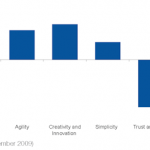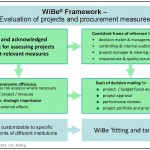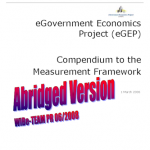Recommendations on Economic Efficiency Assessments in the German Federal Administration,
in Particular with Regard to the Use of Information Technology (current Version 4.1 – 2007; edited by WiBe-TEAM PR 2011 & 2013):
WiBe41_TCBO-EN-Recommendations-on-Economic-Efficiency-Assessments
excerpt: Country Report GERMANY … Germany achieved growth in broadband access and internet use. However eGovernment availability, and usage, particularly among business has slightly stagnated. Germany has a very comprehensive eGovernment programme, which is in a state of change, towards the new 2.0 paradigm of (e)participation, administrative
Read more →
The goal of this brochure is to enable “hype-free” discussion on Cloud computing and align actors around a common understanding. We hope that, like us, you will be convinced of the compelling power of Cloud computing, not just because of its advantages, but also by understanding the
Read more →
Gartner RAS Core Research Note G00168554 2009 This research defines and quantitatively assesses the key business values of the clpud computing paradigm and compares them with the business values of a traditional on-site computing paradigm. Read more …
Read more →
Planning and approving ICT projects requires founded, methodical calculation and documentation of pending costs and anticipated benefits – not just an examination of a project’s feasibility. … This is where the WiBe® Framework comes in.
Read more →
For many companies with a heterogeneous infrastructure, the decision to initiate migration for their data centre is an important theme. This study introduces a concept implemented worldwide to reliably assess up front the economic efficiency of future-planned IT investments.
Read more →
Overview of an European Measurement Approach to eGovernment Efficiency Assessment and User Satisfaction. Paper presented to Emilia-Romagna Regional Government in connection to research on “Creation and experimentation of a methodology for ex ante appraisal/evaluation of eGovernment investments” 2009/2010
Read more →
WiBe-TEAM has been partner in the eGovernment monitor network ‘eGovMoNet’, promoted by the European commission in its Competitiveness & Innovation Framework Programme (CIP). eGovMoNet shared experiences with numerous European public organizations and providers involved in e-Government, and investigated the impact of e-Government services. The implementation of eGovernment
Read more →
The promise of Government 2.0 By embracing Government 2.0 we can: make our democracy more participatory and informed improve the quality and responsiveness of services in areas like education, health and environmental management, and at the same time deliver these services with greater agility and efficiency cultivate
Read more →
Abridged Version: eGovernment Economics Project (eGEP) “Compendium to the Measurement Framework”, prepared for the eGovernment Unit, DG Information Society and Media, European Commission
Read more →



